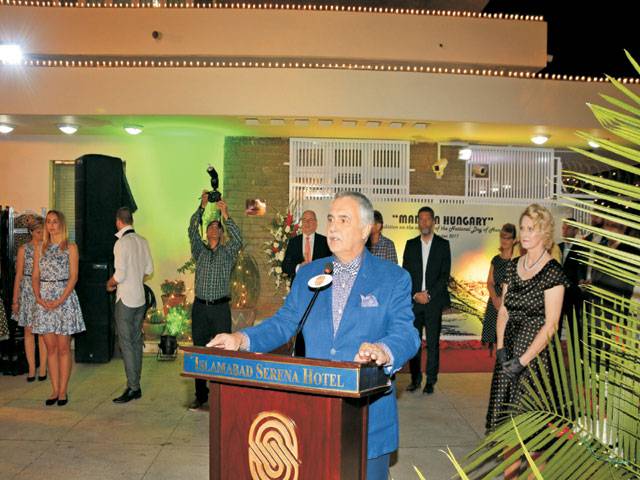Islamabad - 23rd October marks the day of the Hungarian Revolution of 1956, which is one of the most significant events of the country’s history.
In 1989, Communism ended and Hungary became a parliamentary republic.
The Ambassador of Hungary Istvan Szabo hosted a reception at the embassy to celebrate the national day of his country.
The Retro Garden Party of 60’s and ‘Made in Hungary Exhibition’ made the event more colourful and intriguing.
Prominent representatives of the authorities, members of the diplomatic corps, businessmen and civilians took part in the reception and admired the decor of the event.
The Retro Garden Party of 60’s revived the number of a diverse trend of 1960’s. Some of the participants dressed in 60’s fashion and style were enjoying the party. Hungarian special food and the Wild Man Goes Pakistani-Hungarian Rock Band musical performance of the 60-s and 70-s made the event more entertaining and classic.
The fast-changing political scenario of Pakistan, visit of Mian Muhammad Nawaz Sharif to Saudi Arabia and US Secretary of State Rex Tillerson‘s visit to Pakistan were the hot topics among the participants. The anticipation of Shahbaz Sharif taking over the party and Nawaz Sharif’s visit to Saudi Arabia increased the curiosity among many ambassadors. Former Interior Minister Aftab Ahmed Khan Sherpao, former Finance Minister Naveed Qamar and former Vice President of ICCI Rashid Hamayon were busy in discussion regarding the economy of Pakistan. Istavan Zsaba is a genius, modest and a man of vision who always promoted the bilateral cooperation between Pakistan and Hungry through these kinds of events. He is in Islamabad for the last five years and his contribution is much more than any other ambassador of Hungary in Islamabad.
Hungary’s multinational Oil and Gas Company Mol has made a revolution in discovering oil in Pakistan and production of oil is more than 50 percent of the total production of oil in Pakistan.
The Ambassador of Hungary Istvan Szabo delivered a speech on this occasion in which he remembered and paid tribute to the struggle and the sacrifices of heroes of the Revolution and Freedom Fighters of 1956. He said that in the 60’s – despite the Iron Curtain – influence of the west was visible in the way of dressing, in fashion, and the increasing popularity of beat and rock and roll was unquestionable.
While sharing his memoir of young age, he said that his family was not listening to the Voice of America including the beat music programs of Teenager Party freely at that time. This evening revived the past when Hungarian people enjoyed a limited and controlled liberty in their private lives, which slowly and invisibly led to the erosion of the rigid communist structure, he added.
He also mentioned the pictures of Hungarian inventions by this small exhibition of “Made in Hungary” in the middle of the garden.
He convinced that scholarship program with Pakistan will bring up young talents and the joint efforts by Hungarian as well as Pakistani scientists will lead to new inventions in near future.
He thanked the sponsors of the event the Hungarian MOL Oil and Gas Company, the Budapest Water Works for their valuable contribution to the event.
‘Made in Hungary Exhibition’ provided the opportunity to the participants to deepen their awareness about the Hungarian inventions and creative people who made an immense contribution in various fields across the world.
Hungary ranks 16th in the number of Nobel Prizes, as 12 Hungarians have received this honourable award in the fields of physics, chemistry, medicine, economics and literature.
The photos exhibition was thought provoking and gave a detailed account of various inventions. The simplest invention was made by Laszlo Biro. He replaced the quill and fountain pens with the modern ball-point pen and introduced the latest way to write.
In the field of IT and communications, the services of Hungarian men are exceptional. Tivadar Puskás invented the telephone exchange in 1877, while János von Neumann was the inventor of digital computing. In 1936, Kálmán Tihanyi introduced the first plasma TV and flat-panel TV. The tungsten lamp was created by the work of Hungarians Sándor Just and Imre Bródy among others.
Ányos Jedlik was the first to make a soda water machine, while another Hungarian Joseph Petzval invented binoculars and opera glasses among other things. The man who served the world in the health sector was Albert Szent-Györgyi. He was a Hungarian biochemist and Rubik’s Cube by professor Erno Rubik was another Notable inventions.
–The writer is a freelance contributor






